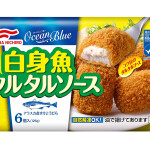China’s biggest listed seafood firm is hailing bumper sales during the latest Singles Day, the annual November 11 buying frenzy created by Alibaba in the style of Black Friday in the USA. Zhangzidao is claiming almost CNY 10 million in sales of imported seafood during November 11 through its store on Tmall (also known in Chinese as Tian Mao), which is China’s leading Business-to-Consumer (B2C) website and owned by Alibaba.
That figure in fact looks modest considering Tmall racked up over CNY80 billion during Singles Day. But Zhangzidao –which also likes to be known by its international sounding ‘Zoneco’ moniker – also sold seafood through the other big B2C sites like JD.com and the firm also does sales through its own website.
Zhangzidao claims its 2015 Singles Day sales were a significant increase on last year’s but didn’t provide any figures. It did say that its number one selling item was Canadian lobster, and reported brisk sales for French oysters –the company’s fastest growing category in terms of Singles Day sales.
Better known as a shellfish producer, Zhangzidao has racked up significant debt in expanding its logistics and marketing operations required for a successful online commerce operation. But the investment is starting to look like a wise move because online commerce is completely changing retailing in China and this will increasingly change the way seafood is sold in China.
By being an early mover in online sales of its shellfish and imported seafood, Zhangzidao is getting a head start on the rest of the pack as Chinese consumers continue to embrace e-commerce faster than any other nation. China’s top shrimp processor Guolian Aquatic has also invested significantly in online sales but Zhangzidao seems to be winning the race.
The recent move by Zhangzidao to secure Marine Stewardship Council (MSC) certification should also be seen in this light: sustainability in China is interchangeable in local consumers’ eyes with safety and quality and having the logo allows Zhangzidao bragging rights over its rivals. Opening flashy bricks and mortar stores is also part of the company’s online strategy: these are meant to complement online sales by giving consumers a place to taste, pick up or purchase online offerings and vice versa.
The data which Zhangzidao is collecting from its online efforts could also prove the most valuable by-product of its online efforts. The ability to track and profile customers habits, location and price sensitivity allows for an increasingly accurate targeting of consumers with particular seafood products and species.
The biggest competitor facing Zhangzidao may be Tmall itself, which also independently sources seafood throughout the world to sell on its site – margins on seafood imports are so good that even the Chinese wing of Amazon started selling seafood in 2013. Like Zhangzidao (which this year also heavily promoted its Ecuadorian shrimp and Russian king crab) Tmall likes to boast the cosmopolitan nature of its seafood selection, and allows customers to return products they’re not satisfied with.
It’s the hard-won credibility, traceability and promotion power of online players like Zhangzidao, Tmall and JD.com that are winning over consumers who also like the prompt delivery (Zhangzidao uses third party freight firm Shun Feng) of these online seafood vendors. It’s a performance unmatched by local retailers, who typically offer scant information on their products’ source. They’ll be forced to adapt and catch up or die.
Smaller overseas seafood producers like going with established players like Tmall or Zhangzidao: opening a store on Tmall isn’t for everyone: there’s about USD40,000 in start up fees and 0.5 to 1 percent commission to consider for a company setting up its own store on Tmall. There may also be extra marketing spend to drive sales. But given Tmall Global (a newer division of the firm) now offers the chance to export directly to China from abroad it’s become a realistic alternative to the traditional distributor relationships which foreign seafood brands have had to set up in China.
The power of online sales is changing retailing in China and with it the way seafood is sold. But the very nature of the industry may also be changed as firms like Zhangzidao and Guolian shift from aquaculture and processing to the higher margins in distribution of seafood. The gimmick that is Singles Day in China only highlights how fast the change is happening.






